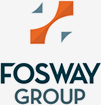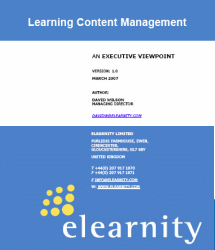
Elearnity research highlights the need for learning content management
Elearnity, Europe's leading Corporate Learning Analyst, today announced the results of an in-depth research project into the role and value of learning content management in corporate learning, with participation from a range of leading corporates. Elearnity's research strongly indicates that large organisations need coherent strategies for producing and managing learning content that are geared to the needs and structure of their business. Findings from the research are summarised in an Executive Viewpoint paper, now available from Elearnity's Research Knowledge Centre.
Elearnity, Europe 's leading Corporate Learning Analyst, today announced the results of an in-depth research project into the role and value of learning content management in corporate learning.
Elearnity has been tracking the Learning Content Management (LCM) market for over five years. During this time, corporate awareness of LCM has changed from apathy and confusion, to increasing recognition of the lack of learning content strategies in their current thinking. This growing corporate awareness led Elearnity to initiate a formal research project to develop a clearer understanding of the drivers, solutions and realities of learning content management in large corporates. Core participant organisations in the research included B&Q, BP, HSBC, LloydsTSB, PricewaterhouseCoopers, Reuters, Rolls-Royce, and Vodafone. The research also involved direct input and support from leading solution vendors including Eedo Knowledgeware, Giunti Labs, OutStart and SumTotal Systems.
"Elearnity's research strongly indicates that large organisations need coherent strategies for producing and managing learning content that are geared to the needs and structure of their business" said David Wilson, Elearnity's founder and managing director, "The key drivers for LCM are largely common across organisations: cost and time to market, flexibility, control and reuse, compliance and auditability".
Findings from the research are summarised in an Executive Viewpoint paper, now available from Elearnity's Research Knowledge Centre. Analysis from the research indicates three common scenarios of LCM interest: collaborative e-learning development, distributed management of (mainly) classroom materials, and large-scale learning content production for all forms of learning.
Conclusions from the research also include:
- LCM is not a mature capability in organisations, and has been largely led from the e-learning sector. LCMS in particular is still an emergent market.
- All of the organisations profiled in the research believed their LCM projects have been successful, with significant benefits being achieved in terms of production costs/times and scalability. But all of them have had negative experiences along the way, both technically and organisationally.
- LCM is really about reengineering the supply chain for learning content, internally and externally. It is about a more holistic and connected view of learning content. Significant changes to working processes and skills are required to leverage a LCM solution properly.
- Adopting an LCM solution will particularly challenge the expectations of sophisticated e-learning producers who are used to a more open design and development model, and free choice of authoring tools. Managing the engagement process with sophisticated stakeholder groups is critical to sustainable adoption.
- Standards will always force compromise, but are important for future proofing the learning content against change in need as well as change in tools or media.
The LCM Executive Viewpoint can be accessed via Elearnity's Knowledge Centre at: http://www.elearnity.com/A555F3/research/research.nsf/ByKey/DWIN6ZAJFR .


